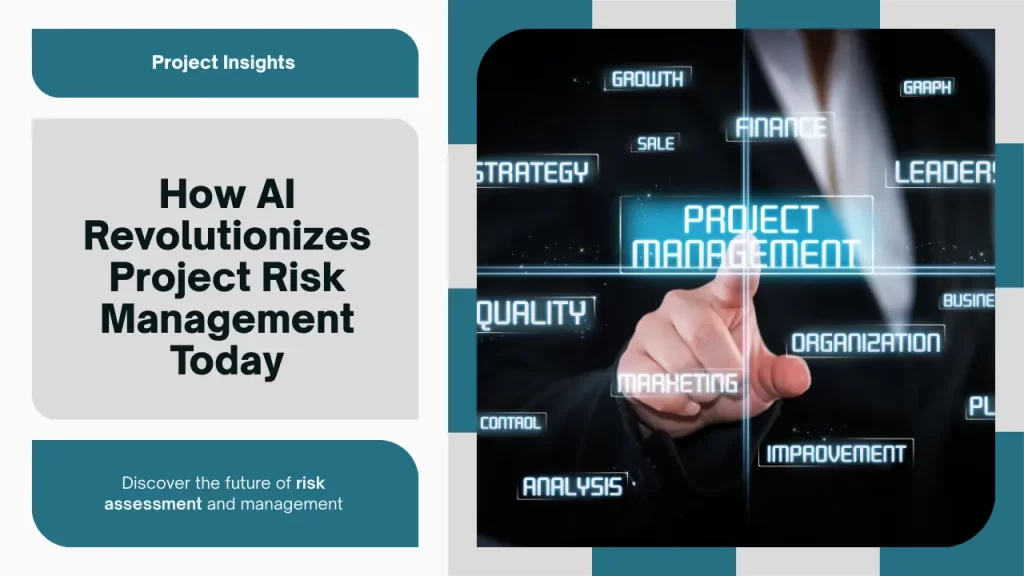Introduction: The Role of AI in Project Management
Project management has traditionally involved detailed planning, manual task tracking, and constant communication between team members to ensure the timely delivery of projects. However, with the rise of artificial intelligence (AI), project management is undergoing a profound transformation. In 2025, AI tools for project management are helping project managers automate repetitive tasks, predict risks, and optimize resources.
AI is enabling project teams to achieve higher productivity, better collaboration, and more effective decision-making, all while minimizing human error. This article explores the impact of AI tools on project management, key tools available in the market, and how they improve project outcomes.
Main Objective: This article explores the importance of AI tools for project management, their benefits, the top tools to consider, and their potential to drive project success in 2025.

What Are AI Tools for Project Management?
AI tools for project management are software solutions that utilize artificial intelligence to automate processes, provide insights, and assist in decision-making throughout the lifecycle of a project. These tools can handle everything from task prioritization and scheduling to risk assessment and team collaboration.
By analyzing vast amounts of project data, AI tools help project managers make more informed decisions, allocate resources more efficiently, and ensure the successful completion of projects. Some AI-powered tools can even predict potential project delays, suggest corrective actions, and automate routine tasks to save time and reduce human error.
Key AI Capabilities in Project Management:
- Automated Task Management: AI tools can automate task assignment, track project progress, and send reminders for deadlines, reducing administrative work for managers.
- Predictive Analytics: By analyzing historical project data, AI tools can predict potential risks, delays, and bottlenecks, allowing teams to address issues before they arise.
- Resource Optimization: AI tools help project managers allocate resources more effectively by identifying bottlenecks, predicting future resource needs, and suggesting the best resource allocation strategies.
- Smart Reporting and Dashboards: AI can provide real-time insights into project progress, financials, and team performance through automated reports and interactive dashboards.
Key Benefits of AI Tools for Project Management
AI tools offer several advantages to project managers and teams. By integrating AI into project management workflows, companies can streamline processes, improve decision-making, and increase overall efficiency. Here are the key benefits:
1. Improved Decision-Making
AI tools use advanced data analytics to provide real-time insights into project performance. By analyzing historical data and real-time project data, AI tools can suggest data-driven recommendations, helping project managers make better-informed decisions.
2. Enhanced Efficiency
Automating repetitive tasks such as scheduling, task assignment, and reporting frees up valuable time for project managers and team members. This increases efficiency and allows the team to focus on more critical project activities.
3. Risk Management and Forecasting
Predictive analytics powered by AI can help project managers foresee potential issues, such as delays, budget overruns, or resource shortages, before they become significant problems. Early identification of risks gives teams a chance to mitigate them in advance.
4. Better Resource Allocation
AI tools can analyze resource usage patterns, workloads, and project timelines to recommend the most efficient use of resources. This optimization ensures that the right people are working on the right tasks at the right time.
5. Collaboration and Communication Enhancement
AI tools can facilitate better communication between team members by providing automated updates, task reminders, and progress reports. They can also integrate with popular communication tools like Slack and Microsoft Teams to ensure seamless collaboration.
Top AI Tools for Project Management in 2025
With a wide range of AI-powered project management tools available, it can be overwhelming to choose the right one. Here are some of the top AI tools in 2025 that are transforming project management:
1. Monday.com
- Use: AI-powered work operating system for project management.
- Features: Customizable workflows, automations, real-time collaboration, and integrations with over 40 popular apps.
- Best For: Teams looking for an intuitive, customizable platform to streamline project management.
- Website: monday.com
2. Trello (with Butler Automation)
- Use: Project management tool with AI-powered automation features through Butler Automation.
- Features: Customizable task management, AI-driven automation for task assignments, and reminders.
- Best For: Small to medium-sized teams that need a simple yet powerful tool for managing tasks.
- Website: trello.com
3. Wrike
- Use: AI-powered work management platform for teams and project managers.
- Features: AI-driven task management, time tracking, reporting, and team collaboration tools.
- Best For: Teams that require advanced project tracking and team collaboration capabilities.
- Website: wrike.com
4. Smartsheet
- Use: AI-powered platform for project management and collaboration.
- Features: Resource management, Gantt charts, reporting, and workflow automation.
- Best For: Enterprises looking for a scalable and customizable project management tool.
- Website: smartsheet.com
5. ClickUp
- Use: Comprehensive project management and productivity tool with AI-powered features.
- Features: Task management, automation, reporting, and integrations with third-party tools.
- Best For: Teams looking for an all-in-one solution to manage projects, tasks, and collaboration.
- Website: clickup.com
6. Asana (with AI-Powered Workflow Automation)
- Use: Popular project management tool with AI-driven workflow automation and reporting features.
- Features: Task tracking, workflow automation, project timelines, and predictive project insights.
- Best For: Teams needing robust task management and collaboration features, with a focus on workflow automation.
- Website: asana.com
7. Forecast
- Use: AI-powered project management platform focused on resource planning, forecasting, and project execution.
- Features: Predictive analytics, AI-driven project timelines, and resource optimization.
- Best For: Project managers who need to predict project outcomes and optimize team performance.
- Website: forecast.app
How AI Tools Improve Global Collaboration
As businesses expand across borders, managing projects with diverse teams becomes increasingly complex. AI tools are bridging these challenges by enabling seamless collaboration, even across different time zones and cultures.
AI-powered tools like ClickUp and Monday.com offer real-time collaboration, language translation, and automatic time zone adjustment features. This ensures that all team members, regardless of location, can stay on the same page and contribute to the project’s success.
Moreover, AI tools can automate the scheduling of meetings and tasks, taking into account team members’ availability, ensuring that nothing slips through the cracks.

AI in Project Risk Management
Project risk management is one of the most crucial aspects of successful project management. AI tools can significantly enhance the process by predicting potential risks based on historical project data and external factors.
For example, tools like Forecast use machine learning to assess project data, highlighting potential delays or issues before they happen. By proactively identifying risks, teams can take corrective actions in advance, ensuring smoother project execution.
AI can also track how risks evolve over time, giving project managers insights into risk mitigation strategies that have worked in the past.
AI-Powered Project Reporting
Traditional project reporting is often manual and time-consuming, requiring project managers to sift through various data points to generate progress reports. AI tools simplify this by automating report generation.
Wrike and Smartsheet provide real-time reporting and dashboards that display key metrics such as budget tracking, resource allocation, and timeline adherence. These reports are dynamic and can be adjusted based on project goals, ensuring that managers have up-to-date information at all times.
Conclusion
AI tools are revolutionizing project management by automating repetitive tasks, improving decision-making, enhancing team collaboration, and helping managers predict and mitigate risks. As AI technology continues to evolve, project management tools will only get smarter, offering even more advanced features to help businesses meet project goals with greater efficiency.
By adopting AI-powered solutions like Monday.com, Trello, Wrike, and ClickUp, businesses can streamline workflows, improve team productivity, and ensure that projects are delivered on time and within budget.
For project managers and teams in 2025, AI tools for project management are no longer a luxury—they are a necessity.
FAQs on AI Tools for Project Management
Q1: What are AI tools for project management?
AI tools for project management are software solutions that utilize artificial intelligence to automate processes, analyze data, and assist in decision-making throughout the project lifecycle. They help in task automation, risk prediction, resource optimization, and real-time reporting.
Q2: How do AI tools improve project efficiency?
AI tools improve project efficiency by automating repetitive tasks like scheduling, task assignments, and reporting. This allows project managers and teams to focus on high-priority tasks, reducing the chances of human error and ensuring better overall productivity.
Q3: Can AI tools predict project risks?
Yes, AI tools can predict project risks using predictive analytics. By analyzing historical project data and external factors, these tools can identify potential issues such as delays, resource shortages, or budget overruns, allowing project managers to take proactive measures.
Q4: Which AI tools are best for project management?
Some of the best AI tools for project management include Monday.com, Trello with Butler Automation, Wrike, Smartsheet, ClickUp, and Forecast. These tools offer a wide range of features like task automation, predictive analytics, real-time collaboration, and resource optimization.
Q5: How can AI tools enhance team collaboration?
AI tools enhance team collaboration by providing features like real-time updates, task reminders, and shared dashboards. Tools such as ClickUp and Monday.com allow teams to stay aligned, manage tasks efficiently, and communicate seamlessly across different locations and time zones.
Q6: Are AI tools customizable for different industries?
Yes, many AI tools for project management are highly customizable and can be tailored to the needs of different industries. Whether you’re in construction, marketing, or software development, tools like Smartsheet and Wrike can be adapted to suit specific project requirements.
Q7: Do AI tools help with resource management?
AI tools significantly enhance resource management by analyzing past project data, forecasting resource needs, and suggesting optimal resource allocation strategies. This ensures that teams use their time and assets efficiently, avoiding resource bottlenecks and maximizing productivity.
Q8: Can AI tools integrate with other software?
Yes, most AI-powered project management tools can integrate with other business applications such as communication tools (e.g., Slack, Microsoft Teams), file-sharing platforms (e.g., Google Drive, Dropbox), and productivity suites (e.g., Google Workspace, Microsoft Office 365). This ensures seamless collaboration across platforms.
Q9: Are AI tools secure for handling sensitive project data?
AI tools for project management are typically designed with robust security features such as encryption, secure cloud storage, and compliance with data protection regulations (like GDPR). However, it’s always important to check the security protocols of the specific tool you choose.
Q10: How do AI tools for project management impact project budgets?
AI tools can help manage project budgets more effectively by tracking expenses, predicting cost overruns, and providing real-time financial insights. By automating financial reporting and monitoring, AI tools can help ensure that projects stay within budget.
Q11: How do AI tools contribute to decision-making in project management?
AI tools support data-driven decision-making by providing insights through predictive analytics, historical data analysis, and automated reporting. These insights help project managers make better decisions, whether it’s about resource allocation, timeline adjustments, or risk mitigation.
Q12: Are AI tools easy to use for non-technical teams?
Yes, most AI project management tools are designed with user-friendly interfaces that don’t require extensive technical knowledge. Tools like Trello and Asana offer simple drag-and-drop features, while more advanced tools like Wrike and Smartsheet provide customizable templates and tutorials to help users get started quickly.
Q13: How often should AI tools be updated in project management?
AI tools should be regularly updated to ensure that they stay aligned with the latest technological advancements and to improve their functionality. Regular updates help maintain the accuracy of predictive analytics and keep the system running smoothly.
Q14: Can AI tools help in managing remote project teams?
Yes, AI tools can greatly benefit remote project teams by providing real-time collaboration, task management, and automated updates. These tools help keep team members aligned, regardless of their location, by automating communication and providing transparency across tasks and timelines.

